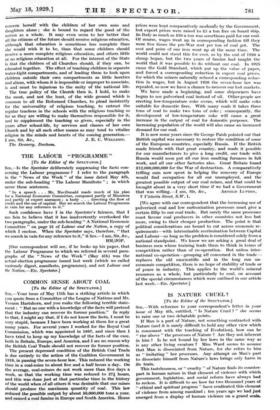COMMON SENSE ABOUT COAL [To the Editor of the SPECTATOR.]
Sin,—Your issue of May 11th has a striking article in which you quote from a Committee of the League of Nations and Mr. Vernon Hartshorn, and you make the following terrible state- meat: "But no one with a knowledge of the facts will pretend that the industry can recover its former position." In reply to that, I might say that, if I do not know the facts, I must be very stupid, because I have been working at them for a great many years. For several years I worked for the Royal Coal ,Commission, which was appointed in 1867, and since then I have tried to keep up my knowledge of the facts of the case, both in Britain, Europe, and America, and I see no reason why the British Coal Trade should not recover its former position. The present depressed condition of the British Coal Trade is due entirely to the action of the Coalition Government in 1919, in passing the seven-hour law. This reduced the working time in a coal-mine to about five and a half hours a day. On the average, coal-miners do not work more than five days a week, so that the working time was reduced to 274 hours, and this was done just at that particular time in the history of the world when of all others it was desirable that our mines should produce the maximum quantity of coal. This law reduced the possible output by about 50,000,000 tons a year, and caused a coal famine in Europe and South America. Home prices were kept comparatively moderate by the Government, but export prices were raised to £5 a ton free on board ship. In Italy as much as 110 a ton was sometimes paid for our coal. Of course, wages went up in corresponding fashion till they were five times the pre-War cost per ton of coal got. The cost and price of our iron went up at the same time. The world could not stand this for ever, so by the end of 1920 a slump began, but the two years of famine had taught the world that it was possible to do without our coal. In 1925 came the Gold Standard, which put up the value of paper, and forced a corresponding reduction in export coal prices, for which the miners naturally refused a corresponding reduc- tion in wages, but in August 1926 the seven-hour law was repealed, so now we have a chance to recover our lost markets.
We have made a beginning, and some shipowners have begun to use pulverized coal instead of oil. Other people are erecting low-temperature coke ovens, which 'will make coke suitable for domestic fires. With many coals it takes three tons of coal to make two tons of coke ; consequently, the development of low-temperature coke will cause a great increase in the output of coal for domestic purposes. The increasing population of the world will also cause an increased demand for our coal.
It is now some years since Sir George Paish pointed out that British capital was necessary to restore the condition of some of the European countries, especially Russia. If the British made friends with that great country, and made it possible for our manufacturers to give a long credit, our trade with Russia would soon put all our iron smelting furnaces in full work, and all our other factories also. Great Britain found • 112,000,000,000 for the War of destruction. A comparatively trifling sum now spent in helping the recovery of Europe would find occupation for all our unemployed, and the greatest possible output of our coal mines, and that could be brought about in a very short time if we had a Government that was willing.—I am, Sir, &c., ARNOLD LUPTON. 7 Victoria Street, S.W.1.
[We agree with our correspondent that the increasing use of pulverized coal and low carbonization processes must give a certain fillip to our coal trade. But surely the same processes must favour coal producers in other countries not less but more, owing to their cheaper production. The point is that political considerations are bound to cut across economic re- quirements—with interminable recrimination between Capital and Labour—so long as the problem is considered solely from a national standpoint. We know we are asking a great deal of business men whose training leads them to think in terms of competition rather than of co-operation. But unless inter- national co-operation—grouping all concerned in the trade— replaces the old unscientific and in the long run un- economic competition, there is no hope of stability of trade or of peace in industry. This applies to the world's mineral resources as a whole, but particularly to coal, on account of the special circumstances which were outlined in our article last week.—En. Spectator.]












































 Previous page
Previous page